|
|
|
Sort Order |
|
|
|
Items / Page
|
|
|
|
|
|
|
| Srl | Item |
| 1 |
ID:
158725
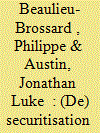

|
|
|
|
|
| Summary/Abstract |
This article theorises the simultaneous enaction of securitising and desecuritising moves. It argues that the frequent simultaneity of these two processes, which are normally considered mutually exclusive within Securitisation Theory (ST), has previously gone unnoticed given a set of methodological, temporal, and ontological biases that have developed within ST. Demonstrating how these biases can be overcome – and even reconciled with the seminal texts of ST – by drawing on work from within social theory and elsewhere, we argue that the frequent simultaneity of (de)securitising moves most urgently requires us to reconsider the normative status of desecuritisation within ST. Although desecuritisation has traditionally been viewed as normatively positive, we argue that its temporally immanent enaction alongside securitising moves might introduce more violence into security politics and, in fact, exacerbate protracted conflicts. Ultimately, we make the normative ambitions of some within ST more opaque. Desecuritisation is not a shortcut to the ethical-political good within ST.
|
|
|
|
|
|
|
|
|
|
|
|
|
|
|
|
| 2 |
ID:
158722
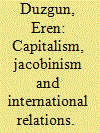

|
|
|
|
|
| Summary/Abstract |
Debates over ‘modernity’ have been central to the development of historical-sociological approaches to International Relations (IR). Within the bourgeoning subfield of International Historical Sociology (IHS), much work has been done to formulate a historically dynamic conception of international relations, which is then used to undermine unilinear conceptions of global modernity. Nevertheless, this article argues that IHS has not proceeded far enough in successfully remedying the problem of unilinearism. The problem remains that historical narratives, informed by IHS, tend to transhistoricise capitalism, which, in turn, obscures the generative nature of international relations, as well as the fundamental heterogeneity of diverging paths to modernity both within and beyond western Europe. Based on the theory of Uneven and Combined Development, Political Marxism, and Robbie Shilliam’s discussion of ‘Jacobinism’, this article first reinterprets the radical multilinearity of modernity within western Europe, and then utilises this reinterpretation to provide a new reading of the Ottoman path to modernity (1839–1918). Such a historical critique and reconstruction will highlight the significance of Jacobinism for a more accurate theorisation of the origin and development of the modern international order, hence contributing to a deeper understanding of the international relations of modernity.
|
|
|
|
|
|
|
|
|
|
|
|
|
|
|
|
| 3 |
ID:
158723
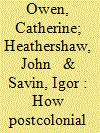

|
|
|
|
|
| Summary/Abstract |
Scholars of International Relations have called for the creation of a post-Western IR that reflects the global and local contexts of the declining power and legitimacy of the West. Recognising this discourse as indicative of the postcolonial condition, we deploy Homi Bhabha’s concept of mimicry and James C. Scott’s notion of mētis to assess whether international political dynamics of a hybrid kind are emerging. Based on interviews with Central Asian political, economic, and cultural elites, we explore the emergence of a new global politics of a post-Western type. We find that Russia substantively mimics the West as a post-Western power and that there are some suggestive examples of the role of mētis in its foreign policy. Among Central Asian states, the picture is more equivocal. Formal mimicry and mētis of a basic kind are observable, but these nascent forms suggest that the dialectical struggle between colonial clientelism and anti-colonial nationalism remains in its early stages. In this context, a post-Western international politics is emerging with a postcolonial aspect but without the emergence of the substantive mimicry and hybrid spaces characteristic of established postcolonial relations.
|
|
|
|
|
|
|
|
|
|
|
|
|
|
|
|
| 4 |
ID:
158727
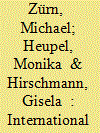

|
|
|
|
|
| Summary/Abstract |
Human rights violations by international organisations (IOs) are a possible side effect of their growing authority. Recent examples are the cases of sexual exploitation by UN peacekeepers and violations caused by IMF austerity measures. In response, IOs increasingly develop safeguards to protect human rights from being violated through their policies to regain legitimacy. We argue that this development can be accounted for by a mechanism we call ‘authority-legitimation mechanism’. We test this theoretical expectation against ten case studies on UN and EU sanctions policies, UN and NATO peacekeeping and World Bank and IMF lending. Next, we demonstrate inductively that the authority-legitimation mechanism can evolve through different pathways, depending on which actors get engaged. We label these pathways legislative institution-building if parliaments in member states put pressure on their governments to campaign for human rights safeguards in IOs, judicial institution-building if courts demand human rights safeguards, like-minded institution-building if civil society organisations, middle powers and IO bodies with little formal power push for human rights safeguards, or anticipatory institution-building if IOs adopt such safeguards from other IOs without having violated human rights themselves. Finally, we argue that which of these pathways are activated and how effective they are depends on specific conditions.
|
|
|
|
|
|
|
|
|
|
|
|
|
|
|
|
| 5 |
ID:
158726


|
|
|
|
|
| Summary/Abstract |
Does the advent of cyber war require us to abandon the traditional ethical framework for thinking about the morality of warfare – just war theory – and develop principles specific to the unique nature of cyber attacks? Or can just war theory still provide an appropriate basis for thinking through the ethical issues raised by cyber weapons? This article explores these questions via the issue of whether a cyber attack can constitute a casus belli. The first half of the article critically engages with recent attempts to provide a new theory of just information warfare (JIW) that is supposedly better suited to the unique character of cyber war insofar as it is grounded the broader meta-ethical framework of information ethics (IE). Yet the article argues that not only is JIW fundamentally unsuitable as a way of thinking about cyber war, but (in the second half) that it is possible to develop a different account of how we can understand a cyber attack as constituting a casus belli in a way that is in keeping with traditional just war theory. In short, there is no need to reinvent just war theory for the digital age.
|
|
|
|
|
|
|
|
|
|
|
|
|
|
|
|
| 6 |
ID:
158719


|
|
|
|
|
| Summary/Abstract |
This article critically examines recent works on resilience. In so doing, it argues that rather than representing some radical rupture with current practices heralding the dawn of a new era, as David Chandler claims, the emphasis on individuals as resilient subjects simply represents a new phase in the neoliberal shift from the state as provider to state as enabler and promoter of self-reliance. Indeed, our present preoccupation with complexity, uncertainty, and resilience can best be understood as reflecting the consequences of neoliberal policies Moreover, the article further argues that there is an attendant danger that resilience thinking may further promote neoliberal forms of governmentality and encourage a degree of political passivity. The emphasis on resilience is in danger of depoliticising highly political choices, shifting attention toward ex-post policies of survival and recovery rather than challenging the current economic order and resisting the further imposition of neoliberal policies on already beleaguered populations. This article therefore argues for shifting our emphasis towards a Foucauldian analysis of power and resistance.
|
|
|
|
|
|
|
|
|
|
|
|
|
|
|
|
| 7 |
ID:
158728


|
|
|
|
|
| Summary/Abstract |
One of the central assumptions underlying the stakeholder model is that strengthened opportunities for involvement of non-state actors in political procedures hold significant promise for making those procedures more democratically legitimate. However, recent studies show that more open international organisations (IOs) are not perceived as more legitimate by non-state actors. In this article we explore one potential reason to explain this apparent paradox, investigating whether, and under what conditions, strengthened opportunities of stakeholder involvement enable the effective representation of global constituencies. The article shows that globalisation and politicisation of IOs go hand in hand with greater political activity by non-state actors defending domestic, rather than global, interests. Globalisation and politicisation may thus contribute to the exponential growth of the community of non-state actors active at IOs, but they do not make such community more globalised in nature. The article also illustrates that granting greater access to stakeholders in international institutions can somehow mitigate the effects of this underlying structural factors, and that institutional openness disproportionally fosters political activity by civic, rather than business, global stakeholders. We advance these arguments relying on a novel dataset including over eight thousand organisations active at the UN climate conferences and the WTO Ministerial Conferences.
|
|
|
|
|
|
|
|
|
|
|
|
|
|
|
|
| 8 |
ID:
158721
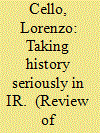

|
|
|
|
|
| Summary/Abstract |
IR scholars have always invoked history as a valuable resource for understanding the present. However, the question of how should we go about investigating and interpreting the past is rarely asked, let alone answered. While most IR approaches are anchored to the attempt to situate oneself outside history – reading the past in terms of the present or in terms of a hypothetical future – this article strives to redress the kind of historical perspective adopted, if at all, by IR scholars. It does so by advancing a distinctive historicist approach that emphasises the importance of understanding past practices and discourses in their own historical and intellectual contexts. In order to substantiate this claim, the article goes on to critically engage with recent calls to historicise intervention in IR, arguing that a historicist mode of analysis represents a corrective to presentism as well as an alternative route into present-day debates.
|
|
|
|
|
|
|
|
|
|
|
|
|
|
|
|
| 9 |
ID:
158720


|
|
|
|
|
| Summary/Abstract |
The academic study of International Relations (IR) emerged in the context of transnational networks of scholars, diplomats, politicians, and activists. Contrary to conventional wisdom, women belonged to these networks in various capacities and, crucially, contributed to the intellectual formation of the discipline. Whether as members of pressure groups, such as the Women’s International League for Peace and Freedom (WILPF), as independent authors or academics, they discussed all major issues of IR. Drawing on a range of international authors – including Anna B. Eckstein, Agnes Headlam-Morley, Lucy Mair, Margery Perham, Helena Swanwick, and Louise Weiss – this article recovers the intellectual substance of their work, arguing that it constitutes a genuinely feminist approach to IR. Early feminist IR authors emphasised the interests of women, children, and other marginalised groups, they demanded female representation in government and diplomacy, they condemned imperialism and racism, opposed military capitalism, employed religious, emotional, and universalist rhetoric, and advocated the role of education. Despite widespread male domination, women taught at universities, published in academic journals, spoke at conferences, and organised international summer schools. This article explores the origins of feminist IR scholarship and contextualises this body of thought within the revisionist history of IR.
|
|
|
|
|
|
|
|
|
|
|
|
|
|
|
|
|
|
|
|
|